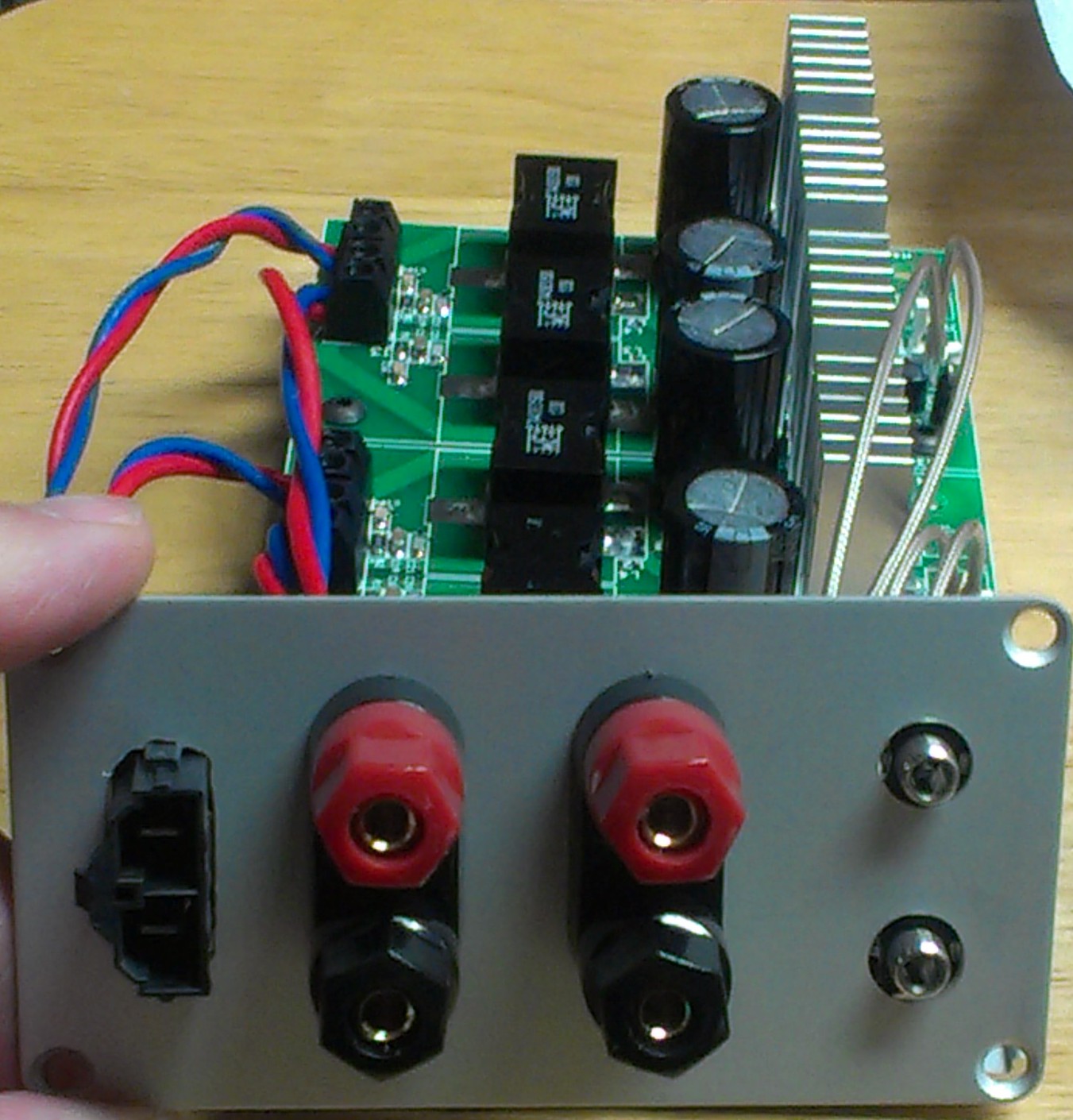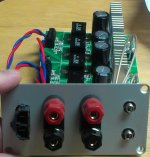Hello
I am curious if you can actually hear the difference between the two binding posts. (one is $8 and the other is $108)
Dayton Post
Dayton Audio BPA-38SN HD Binding Post Pair Satin Nickel
Furutech
Furutech Speaker Binding Posts FP 803 G 2pcs Set 24K Gold Plated | eBay
Thanks in advance.
Yes you will hear a difference.
Sent from my iPad using Tapatalk
The Dayton posts are cast zinc. I received them in a speaker kit from Jantzen Audio. The speakers sounded meh until I accidentally, but providentially broke a post while reinstalling it. I was appalled to see the porous gray metal inside, snapped like chalk with pretty gold paint on the outside. I should have wondered when Jantzen asked me if I wanted brushed nickel finish on my speaker posts.
I removed them and used a radio shack posts like shown above by DUG, just used to clamp the speaker input wire to the speaker cable, the sound improvement was enormous. I think I used a banana on the SC and speaker input through the hole in the side of the post.
I know people love to hate expensive parts, but you do get what you pay for. If it really was a ripoff they would not stay in business for decades.
At least get solid brass posts. Since you have silver wire try to get copper posts, or skip the post and just clamp your hookup wire directly to the speaker cable with cheap posts like Radio Shack.
Do not use any brass in the binding posts. Make certain that the binding posts are of copper or silver. Gold finish is fine.
Sent from my iPad using Tapatalk
Do not use any brass in the binding posts. Make certain that the binding posts are of copper or silver. Gold finish is fine.
May I dare ask why?
Mike
You dare ask why? Is my word not good enough? 


Brass will diminish the sound considerably compared to copper, which gives a nice silky sound, or silver, which gives a brighter sound than copper. I personally prefer copper over silver.
Trust me, your ears will hear a difference.
Brass will diminish the sound considerably compared to copper, which gives a nice silky sound, or silver, which gives a brighter sound than copper. I personally prefer copper over silver.
Trust me, your ears will hear a difference.
Sorry, I can't trust that, even if it is Christmas. 
I've run signal thru copper, brass, mud, a potato and a banana - real banana, the fruit. Very few could tell the difference. Some preferred mud over copper. It's somewhere on the forum. Surprising results!
As long as the contact is good, you won't be able to tell. Honest.
I've run signal thru copper, brass, mud, a potato and a banana - real banana, the fruit. Very few could tell the difference. Some preferred mud over copper. It's somewhere on the forum. Surprising results!
As long as the contact is good, you won't be able to tell. Honest.
I prefer this type...they don't turn.
Drill 2 holes 0.5" dia at 0.75" ctr and you are done.
Unfortunately you can only get red/black.
I'm with DUG on this one. I've used Speakon's extensively and have never had an issue with performance, but I like these twin binding posts that don't rotate and loosen and allow me to use bare wire speaker cable.
There are audible differences between copper, nickel, brass, and silver binding postswhich I have heard. The differences are NOT subtle. There are good reasons why you would want to pay $50-100 for a binding post.
I seriously doubt anyone ran a signal through fruit and not heard a difference.
If you are not hearing differences between a $10 binding post and a quality binding post then something is wrong.
I seriously doubt anyone ran a signal through fruit and not heard a difference.
If you are not hearing differences between a $10 binding post and a quality binding post then something is wrong.
Easy mounting of binding posts.
Nicely done.
What kind of an amp are you attaching the posts to?
Sent from my iPad using Tapatalk
The differences are NOT subtle. There are good reasons why you would want to pay $50-100 for a binding post.
I seriously doubt anyone ran a signal through fruit and not heard a difference.
If you are not hearing differences between a $10 binding post and a quality binding post then something is wrong.
Someone needs a crash course in physics.
Not subtle would be between having a binding post and thus being capable of connecting up and listening to your loudspeaker vs not having a binding post and therefore being unable to connect up your loudspeaker and thus not being able to listen to it.
No one is advocating use a piece of coal as a signal conductor, but providing there is enough of the metal in question, then it really wont make any difference. Next you're going to say that using aluminium as a conductor material would be a horrible experience...when in fact lost of loudspeakers use aluminium in their voice coils.

These clamp well but snap if given a sharp knock. My two year old son has destroyed a couple of these dropping toys down the back of speakers. Also, really easy to short the amp output if using bare wire. These are too close in my opinion. 30mm centers is a safer standard.
Good physical contact maintained over time, ensuring negligible contact resistance, is surely the key for a good post. Claims for audible effects other than contact resistance, seem beyond far fetched.
Someone needs a crash course in physics.
Not subtle would be between having a binding post and thus being capable of connecting up and listening to your loudspeaker vs not having a binding post and therefore being unable to connect up your loudspeaker and thus not being able to listen to it.
No one is advocating use a piece of coal as a signal conductor, but providing there is enough of the metal in question, then it really wont make any difference. Next you're going to say that using aluminium as a conductor material would be a horrible experience...when in fact lost of loudspeakers use aluminium in their voice coils.
There are misconceptions in your statement.
copper is used in voice coils, not aluminum.
Also, the metal in use for any of your connectors, from the rca jacks or binding posts, even the wire, will all make a sonic difference in the signature of the sound. Some will hinder and veil the sound where as others will make your system sing.
I can tell you this with personal experience, with each metal altering the sound., by no small margin, but by a significant audible difference. There are reasons why the more expensive binding posts cost more than others.
Sent from my iPad using Tapatalk

These clamp well but snap if given a sharp knock. My two year old son has destroyed a couple of these dropping toys down the back of speakers. Also, really easy to short the amp output if using bare wire. These are too close in my opinion. 30mm centers is a safer standard.
Good physical contact maintained over time, ensuring negligible contact resistance, is surely the key for a good post. Claims for audible effects other than contact resistance, seem beyond far fetched.
Duck,
I too agree with good physical contact connection is a requirement of audible sound, but it is not the only requirement of getting the best sound. As someone with experience in this area, there is no brass, nickel, aluminum, or zinc connector that will ever come close to the sonic signature of copper or silver connection and wire.
Sent from my iPad using Tapatalk
There are misconceptions in your statement.
copper is used in voice coils, not aluminum.
Really?
Say what?
hahahahahahahahahahahah!!!!!!! Shirley, you jest???
Aluminum voice coils? Why?
There are misconceptions in your statement.
copper is used in voice coils, not aluminum.
Also, the metal in use for any of your connectors, from the rca jacks or binding posts, even the wire, will all make a sonic difference in the signature of the sound. Some will hinder and veil the sound where as others will make your system sing.
I can tell you this with personal experience, with each metal altering the sound., by no small margin, but by a significant audible difference. There are reasons why the more expensive binding posts cost more than others.
Sent from my iPad using Tapatalk
hahahahahahahahahahahah!!!!!!! Shirley, you jest???
Aluminum voice coils? Why?
Really?
Really.
Voice coils are wire wrapped around magnets. wire is of copper usually wrapped around iron. No self respecting speaker manufacturer would ever use aluminum as the winding coil.
To say that voice coils are made of aluminum is analogous to saying an inductor is made of aluminum wire, no speaker manufacturer would ever use that in their crossovers.
Sent from my iPad using Tapatalk
That is 5th element quote - he claims that the wire is made of aluminum in voice coil.
Sent from my iPad using Tapatalk
Last edited:
No self respecting speaker manufacturer would ever use aluminum as the winding coil.
You need to get out more.
http://www.jblpro.com/www/jbl-story...-innovations/tcr-voice-coil-wire#.VJxTFV5-AG4
- Status
- Not open for further replies.
- Home
- Design & Build
- Parts
- Binding Posts - Are They Worth The Money?

